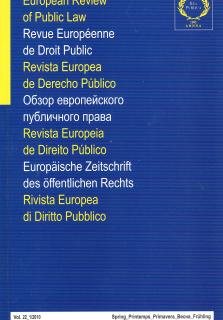
Le droit administratif en europe, 20 ans aprÈs
Rapport introductif
(Administrative Law in Europe, 20 Years After
Introductory Report)
Jean-Bernard Auby
Professeur de droit public à Sciences Po Paris, Directeur de la Chaire
“Mutations de l’Action Publique et du Droit Public” (MADP)
Since the 1970s, the European Public Laws have been submitted to the pression of profound contextual developments: those that are due to Europeanisation and globalisation, those due to the reduction of the State space in favour of the market and the citizens, those due to the territorial decentralisation and the reduction ratio of the State apparatus. These developments, that go on until today, have entailed profound transformations in some of their balances: the system of the rules that structure them, the way in which they comprehend the area and the legal terms of public intervention, and the conception that they have of the disciplines of public action. In order to adapt to such big developments, the European Public Laws open up to diverse attempts of theoretical revitalisation: theories of European Administrative Law, of Global Administrative Law, theory of regulations and economic analysis of the law… The question is raised as to the evolution of both the national models, more or less destabilising, and the European model, for which today a period of competition with the American model is starting.
Depuis les années 1970, les droits administratifs européens ont été soumis à la pression d’évolutions contextuelles profondes: celles qui tiennent à l’européanisation et à la globalisation, celles qui tiennent à la réduction de l’espace de l’Etat au profit du marché et des citoyens, celles qui tiennent à la décentralisation territoriale et à la démultiplication de l’appareil d’Etat. Ces évolutions, qui se sont prolongées jusqu’à aujourd’hui, ont entraîné des transformations profondes dans certains de leurs équilibres: l’appareil des normes qui les structure, la façon dont ils appréhendent le domaine et les modalités juridiques de l’intervention publique, et la conception qu’ils ont des disciplines de l’action publique. Pour s’adapter à ces évolutions lourdes, les droits administratifs européens s’ouvrent à des tentatives diverses de renouvellement théorique: théories du droit administratif européen, du droit administratif global, théorie des régulations et analyse économique du droit… La question est posée de l’évolution à la fois des modèles nationaux, plus ou moins déstabilisés, et du modèle européen, pour qui s’ouvre aujourd’hui une période de compétition avec le modèle américain.





















